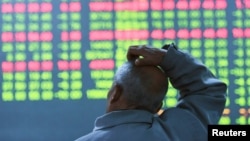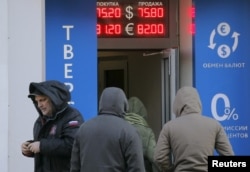U.S. stocks were mixed Monday, trading in a narrow range with small gains and losses, while European markets edged lower and Asian markets tumbled as concerns grow about China's economy.
In Asia, the Shanghai Composite Index plunged 5.3 percent, losing further ground after dropping 10 percent last week. Trading was halted twice last week after heavy losses.
Hong Kong lost 2.8 percent, Sydney shed 1.2 percent, Seoul slipped 1.2 percent, and the Philippines dropped 4.4 percent.
Tokyo was closed for a public holiday, increasing market volatility.
China's currency
In a move that added to the market confusion, China set the midpoint for the yuan stronger (at 6.5626 per dollar), an apparent reversal of the midpoint's recent weakening trend.
Analysts said the move could have calmed concerns about how ready China is to let the currency depreciate, but perceived missteps by Chinese authorities have led to doubts over Beijing's economic competence.
"Authorities are reluctant to let market forces rule, which along with their indecisiveness and lack of transparency is exacerbating uncertainty," Tapas Strickland, an economist at National Australia Bank, told the Reuters news agency. "Understandably, amidst this, global markets are selling Chinese policymaker's ability to control their economy."
London lost 5.3 percent over the last week, Paris shed 6.5 percent and Frankfurt dropped 8.3 percent.
Russian markets
Meanwhile, Russia's national currency fell Monday, dropping nearly 2 percent in the first half hour of trading, to 76.1 rubles per dollar. The market has been closed since a 10-day holiday break began December 31.
Russia's economy is weighted heavily on oil prices, which fell to a 12-year low last week and dropped further on Monday.






